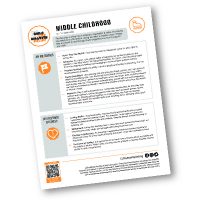
Middle Childhood
(5 - 11 years old)
Families play a critical role in helping to reestablish a sense of normalcy and safety for a child before, during and after a disaster occurs. Please take a moment to read through these suggestions on how to support your child.
My Milestones
- How I View the World: I may see the world in categories: good vs. bad, right vs. wrong, etc.
- Emotions: As I grow, I am getting better at adjusting my emotions based on the situation. I can label when I am happy/sad/mad/etc. As I grow, I am becoming better at communicating my feelings and engaging in more complex problem solving.
- Problem-Solving: While my ability to think logically and flexibly is improving, it is not as advanced as in adults.
- Cause-and-Effect: I am learning that one thing (an object, person, etc.) can have an effect on something else. I am becoming more aware of how this can occur within relationships and how I behave (for example, when I am mean, then my friend doesn’t want to play with me.) This growing understanding, paired with my vivid imagination, can lead me to feeling as though I caused the disaster event to occur by a bad action or choice I made.
- Playtime: Play is still important for me. I need safe opportunities for free play both indoors and outdoors, and to play games with rules such as board games, sports activities, etc. Playing games together, in a safe setting, can help me develop friendships and teach me valuable skills such as taking turns, following rules, good sportsmanship, and more.
My Response to Stress
- Losing Skills: I may temporarily lose previously learned skills (this is called “regression”) after the disaster event. For example, I may begin to have more frequent toileting problems (like bed wetting), sleeping issues, trouble focusing or listening, etc.
- Withdrawal: During this stressful time, I may want more alone time than usual, or I may become overly clingy and struggle with being away from you.
- Change in Behaviors: An increase in aggressive behaviors toward myself and others can occur for a few weeks following the event. I may also misbehave more frequently.
- Concerns for Safety: It is typical for me to have more concerns about my safety and the safety of others. While I play, you may see me pretend or reenact disaster scenes similar to what I experienced.
How Adults Can Help
- Be Honest: Use simple, child-friendly terms to describe the disaster event and how you and other adults in the community will help keep me and our family safe.
- Predictability: Please try and keep our schedule as normal as possible during the weeks to months after the event, especially regarding times to play, eat, and sleep.
- Play with Friends: Keep me in contact with my school and friends to provide a sense of normalcy. (For example, help organize virtual or in-person connections with friends when possible.) Make sure that I have time indoors and outdoors – both with and without my friends.
- Acknowledge My Feelings: There may be times I feel many emotions. I may feel sad, mad, happy, scared, or all of the above on the same day. Please acknowledge and validate my feelings with comments like the following: “I see you feel mad right now. It is okay to feel this way. What is something we can do together to help you feel better?”
- Self-Care: Please take care of yourself. Stay rested, eat well, and drink water. When you are well cared for, then you can take even better care of me.
When to Seek Professional Help
- Trouble Sleeping: If I keep having trouble falling asleep or staying asleep at night for more than a few weeks, I need help from a healthcare professional. Also, if you notice I seem to frequently fall asleep during the day, ask me how I am sleeping at night.
- Not Typical, Heightened Emotions: My fears and anxiety may increase after the event. If this interferes with how I go about my normal daily routines, I need extra support. While it is okay to cry as a natural release of emotion, if I end up crying uncontrollably on a regular basis, please seek extra support from a healthcare professional.
- Withdrawal or Aggressive Behaviors: If I avoid activities that I usually enjoy for an extended period of time or display behaviors that are dangerous to myself or others, please help me to stay safe and seek care from a healthcare professional.
About the Authors
Created in collaboration with: Audrey Haugen*, MS, CCLS, and the Child Life Disaster Relief Resource Sub-Committee
Child Life Disaster Relief Resource Sub-Committee:
- Audrey Haugen, MS, CCLS (Chairperson)
- Jean Cooper, CLS, LCSW (CLDR Executive Director)
- Amber Hill, MS, CCLS
- Jordann Hager, MS, CCLS, CPST
- Jennie Kriznik, MPS, CCLS
- Corey Ford, MS, RBT
- Tessa Randolph, BS, CCLS, CGSS
